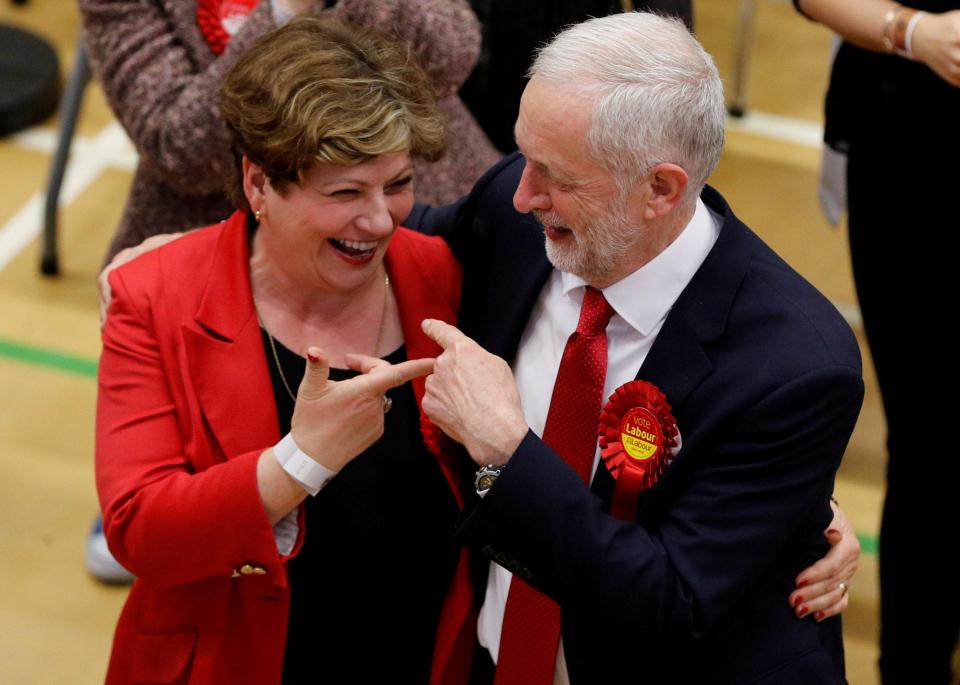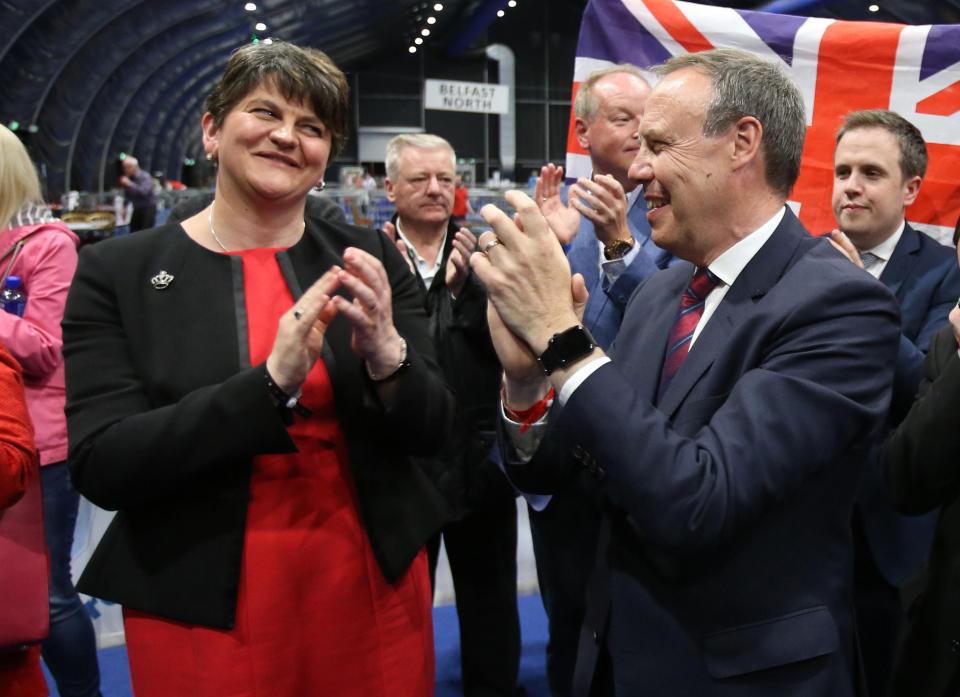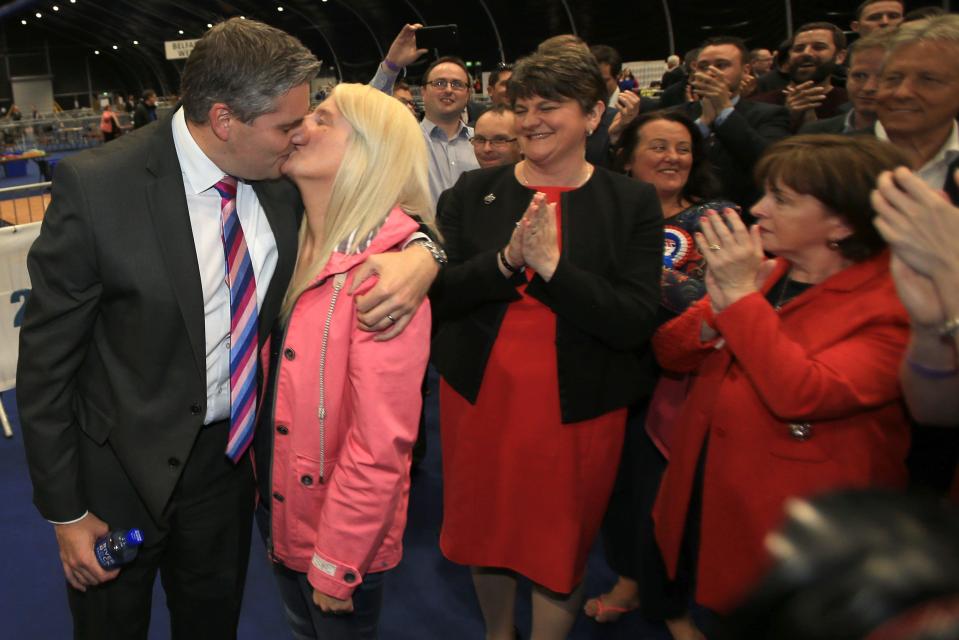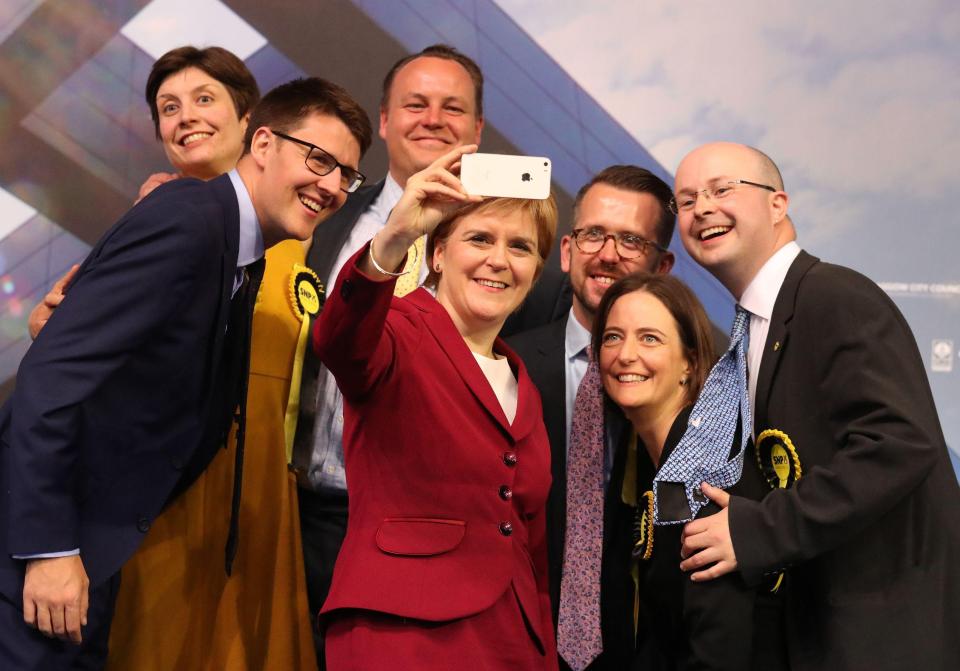How the Tories could cling to power WITHOUT a majority in parliament – as hung parliament sparks scramble for deal

THERESA MAY's huge gamble to win a bigger majority has spectacularly failed - and today she faces the prospect of a minority government or going into a coalition with another party.
She is on course to stay in power with the support of the Democratic Unionist Party in Northern Ireland - after a stunning night in British politics.
With the Tories on course to be the largest party by a large margin, Mrs May has the right to seek to form a government before Mr Corbyn.
And she is heading to Buckingham Palace to tell the Queen she is already in a position to do so.
In the weeks to come she will propose the policies for a Queen's Speech, and she is entitled to wait until the new Parliament begins on 13 June to see if she has the confidence of MPs in the House.
A full coalition with the DUP or the Conservatives trying to a run a minority government are looking like the only real options at this stage in the game.
Either way, to stay in power the PM will have to win a vote on her overall policy programme within two weeks, following the Queen's Speech on June 19.
This morning the DUP's website even crashed as so many people tried to get online to try and find out what they were all about.
Parties could now begin a frantic round of horse-trading in the next few hours to try and create a viable government.
Or Theresa May could continue to try and go it alone - with the huge risk of being unable to get any legislation through parliament as she hasn't enough MPs to guarantee it passing.
Jeremy Corbyn will not be able to form a government even if he struck a deal with the Lib Dems, the SNP AND the Green Party - even though his party has made gains overnight.
John McDonnell and Emily Thornberry have both suggested that the party could form a coalition deal - and ask the other parties to back it - if Mrs May can't command a majority.
But both the Lib Dems and the SNP have ruled out entering a formal coalition, which means a re-run of 2010 is highly unlikely.
If no party can form a stable government, there could be fresh elections in the autumn.
The Conservatives have won 318 seats with Labour on 262, the SNP on 34 and the Lib Dems on 14 and one more seat yet to come.
Any party needs 326 to take a majority of the seats in the Commons - but because Sinn Fein do not take their seats, and the Speaker cannot vote, in practice a government needs just 323 MPs to pass laws and a Budget.
If the Tories can win the support of the Democratic Unionists in Northern Ireland, who have won 10 seats, they could end up with 328 - a TWO SEAT majority.
But if the Tories are to win their support, the Northern Irish MPs are likely to demand more funding and further concessions.
The DUP want to ensure there is no threat to a soft border with the Republic of Ireland because of the economic benefits it brings to the province.
The party also wants to ensure stronger ties with the mainland — while gaining control to lower corporation tax to compete with the Republic.
Mrs May would also be able to govern if she were backed by Lib Dems, but Tim Farron's party has already ruled out a formal deal with either of the main parties.
The DUP leans towards the Tories - the party are pro-Brexit and have spoken out in support of Mrs May in the past.
But this morning there have been talks that the DUP might only seek a confidence and supply deal - where they support the Government only on specific votes rather than an official coalition.
MOST READ IN POLITICS
Her only other alternative is to go it alone - but the whole reason Mrs May called the election was to try and shore up more support for her party.
Former Tory PM John Major became the Prime Minister of a minority government in December 1996 after Labour swept to victory in the Barnsley East by-election.
After 17 years of the Tories in power, it was just a matter of months before he called the election and Tony Blair pulled off a landslide at the polls.
Before that, Britain's last hung parliament came after the February 1974 election, when Harold Wilson's Labour pulled off an unexpected win, but did not have enough seats for a majority.
Six months later, the Government collapsed and another election was called.
In Scotland, the SNP governed as a minority between 2007 and 2011 - they formed alliances and deals with smaller parties to get things done.
Some of the key details from the turbulent election night:
- Hung parliament confirmed with Tories reaching 318 or 319 seats
- Labour forecast to take 261 or 262 - up from 232 in 2015.
- Theresa May faces mounting pressure – with the odds slashed on Boris Johnson to be the next PM
- Fears grow Brexit negotiations could be sunk now that Mrs May has failed to secure a majority
- Lib Dem Nick Clegg loses Sheffield Hallam seat but Vince Cable regains Twickenham while leader Tim Farron clings on
- Home Secretary Amber Rudd holds on to Hastings seat by barely 300 votes meaning she stays a contender to replace the PM
- Huge losses for SNP as former chief Alex Salmond and deputy leader Angus Robertson are both beaten by the Tories.
- Labour on march in London beating Tories to Battersea constituency
- Pound slides two per cent as soon as exit poll predicts hung parliament
- Ukip voters desert party with vote share down by ten per cent - but not all move to the Tories
- Growing fears that Mrs May will have to call a second election later this year
Sir Jeffrey Donaldson of the DUP tonight said that his party would be "serious players" in a hung parliament.
The party is now leaning towards the prospect of swinging the vote - if Mrs May decides to try and form a coalition.
He told the BBC: "This is perfect territory for the DUP because obviously if the Conservatives are just short of an overall majority it puts us in a very strong negotiating position and certainly that is one we would take up with relish."
Despite defying expectations, Mr Corbyn would find it far harder than Mrs May to reach a majority even with the help of every other left-leaning party.
If Labour teamed up with the SNP, Lib Dems, Greens, Plaid Cymru, they would still be short of a working majority.
Like the Lib Dems, the SNP has ruled out a coalition, but Nicola Sturgeon says she would be willing to prop up Mr Corbyn in order to keep the Tories out of power.
She told the BBC tonight: "I hope the SNP can play a part in a progressive alternative to a Tory government."
In 2010, it took the Tories and Lib Dems five days of negotiations to agree to form a coalition.
But with no two parties winning a majority of seats between them, this time the talks on a deal could take much longer - which could also affect our Brexit talks, due to start in just ten days time.


















